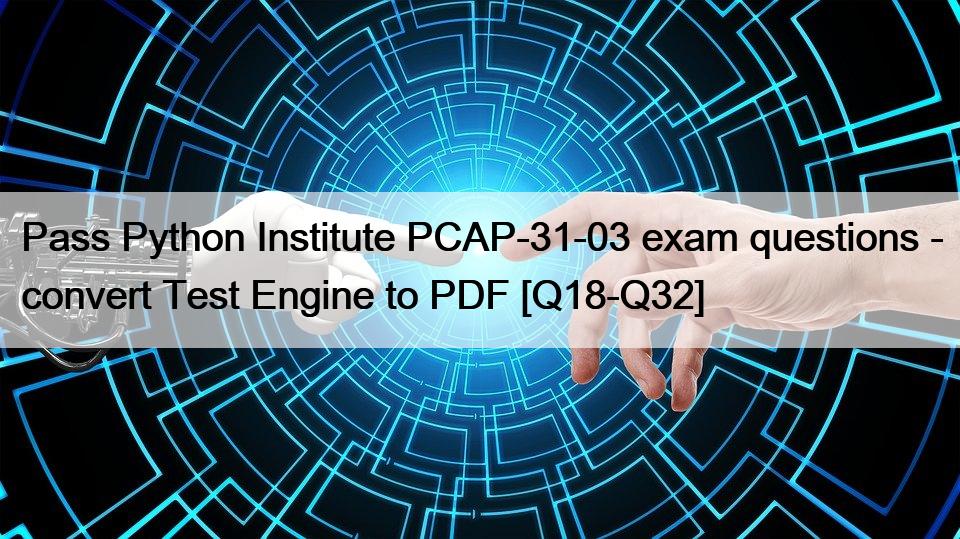Pass Python Institute PCAP-31-03 exam questions – convert Test Engine to PDF [Q18-Q32]
Pass Python Institute PCAP-31-03 exam questions – convert Test Engine to PDF
Pass Your PCAP-31-03 Exam Easily – Real PCAP-31-03 Practice Dump Updated Apr 27, 2023
Topics of PCAP – Certified Associate in Python Programming (PCAP-31-03) Exam
The syllabus for the PCAP-31-03 exam dumps is listed below in detail of each section and their topics:
1. Control and Evaluations (25%)
Objectives covered by this section:
- simple strings: constructing, assigning, indexing, slicing comparing, immutability
- literals: Boolean, integer, floating-point numbers, scientific notation, strings
- building loops: while, for, range(), in, iterating through sequences
- simple lists: constructing vectors, indexing, and slicing, the len() function
- Boolean operators: not and or
- controlling loop execution: break, continue
- expanding loops: while-else, for-else, nesting loops, and conditional statements
- bitwise operators: ~ & ^ | « »
- assignments and shortcut operators
- numeric operators: * / % // + –
- operators: unary and binary, priorities and binding
2. Data Aggregates (25%)
Objectives covered by this section:
- tuples vs. lists: similarities and differences, lists inside tuples and tuples inside lists
- lists in lists: matrices and cubes
- strings in detail: ASCII, UNICODE, UTF-8, immutability, escaping using the character, quotes and apostrophes inside strings, multiline strings, copying vs. cloning, advanced slicing, string vs. string, string vs. non-string, basic string methods (upper(), lower(), isxxx(), capitalize(), split(), join(), etc.) and functions (len(), chr(), ord()), escape characters
- dictionaries: building, indexing, adding and removing keys, iterating through dictionaries as well as their keys and values, checking key existence, keys(), items(), and values() methods
- tuples: indexing, slicing, building, immutability
3. Functions and Modules (25%)
Objectives covered by this section:
- converting generator objects into lists using the list() function
- the if operator
- hiding module entities
- lambda functions, defining and using
- defining and invoking your functions and generators
- import directives, qualifying entities with module names, initializing modules
- return and yield keywords, returning results, the None keyword, recursion
- writing and using modules, the name variable
- name scopes, name hiding (shadowing), the global keyword
- map(), filter(), reduce(), reversed(), sorted() functions and the sort() method
- Python hashbangs, using multiline strings as module documentation
- pyc file creation and usage
- parameters vs. arguments, positional keyword and mixed argument passing, default parameter values
4. Classes, Objects, and Exceptions (25%)
Objectives covered by this section:
- exceptions hierarchy, assigning more than one exception to one except branch
- single inheritance vs. multiple inheritances
- introspection: dict, name, module, bases properties, examining class/object structure
- class methods: defining and using the self-parameter meaning and usage
- the try-except-else-finally block, the raise statement, the except-as variant
- read(), readinto(), readline(), write(), close() methods
- defining your classes, superclasses, subclasses, inheritance, searching for missing class components, creating objects
- the init method
- the anatomy of an exception object
- inheritance and overriding, finding class/object components
- assertions
- adding your exceptions to an existing hierarchy
- writing and using constructors
PCAP-31-03 Real Exam Questions and Answers FREE: https://www.premiumvcedump.com/Python-Institute/valid-PCAP-31-03-premium-vce-exam-dumps.html

